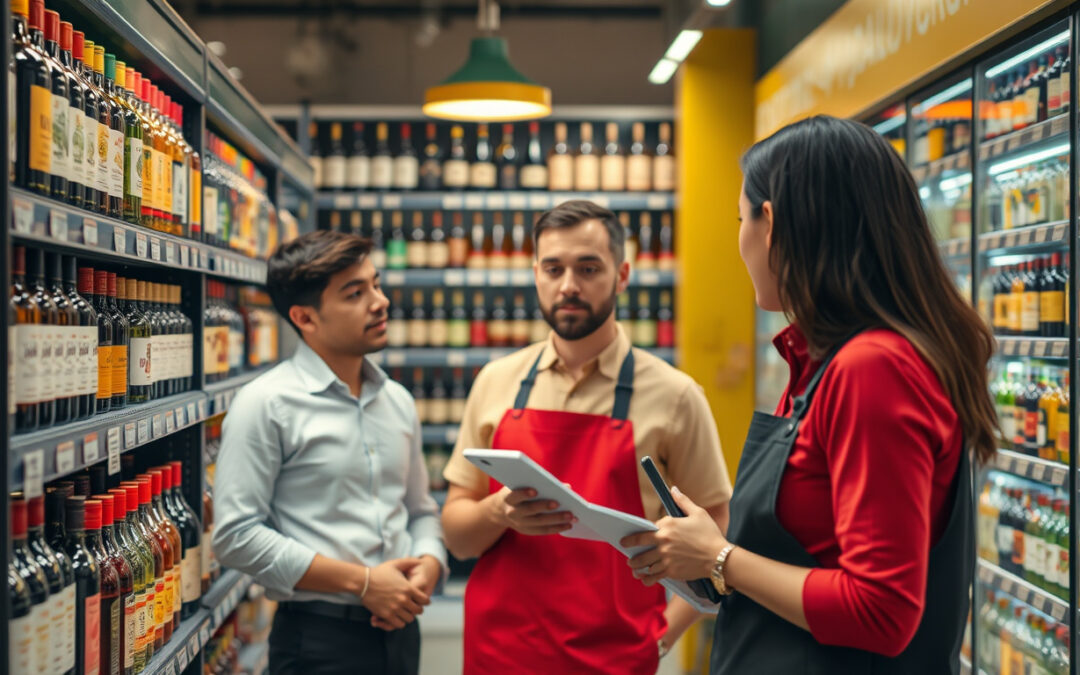In a competitive retail beverage market, alcohol sales training remains vital. Businesses need strong training to boost performance and raise customer satisfaction. Whether you run a liquor store, supermarket, or bar, good training gives staff the knowledge, skills, and confidence to drive sales and obey rules. This article shows clear strategies for alcohol sales training that help your retail business grow.
Why Alcohol Sales Training Is Essential
Alcohol sales training goes beyond selling products. It builds responsible selling habits. It meets customer needs and respects legal rules. Good training cuts the risk of alcohol-related trouble, improves customer service, and leads to more sales and repeat visits.
Retail staff face many moments—checking IDs, answering questions about beverages—and without good training, these moments lose value or become legal risks. Investing in thorough training creates a team that works confidently even under pressure.
Key Components of Effective Alcohol Sales Training
To get the most from alcohol sales training, your program must cover these core points:
1. Understanding Legal Regulations and Compliance
Retail sales of alcohol work under strict laws that differ by region. These laws cover age checks, sale times, and allowed quantities. A good program teaches staff these rules to prevent fines and legal problems. Employees must:
- Verify customer IDs
- Spot signs of intoxication
- Know when to stop service
- Follow local and national laws
2. Product Knowledge and Customer Engagement
Knowing your products well helps staff guide customers. Training should focus on:
- Types of alcoholic drinks (beer, wine, spirits)
- Taste notes and pairings
- Current trends and well-known brands
- Ways to upsell and cross-sell based on what customers like
This product knowledge builds better customer links and loyalty.
3. Sales Techniques and Customer Service
Alcohol sales training must include proven sales steps suited for retail. Role-playing, handling objections, and active listening all help staff connect with customers. Recommending side products and suggesting premium options can boost sales value.
4. Responsible Selling and Conflict Resolution
Training must stress the need to sell responsibly to keep customers and the business safe. Staff learn to handle tough moments, such as refusing service to intoxicated buyers, with tact and smart responses. Learning conflict resolution and de-escalation helps keep the store safe and friendly.
Strategies to Implement an Effective Alcohol Sales Training Program
A successful training program needs planning and lasting effort. Here are practical steps to set up and keep a strong program:
1. Customize Training to Your Business Needs
Every retail place is different. Tailor alcohol sales training to your products, customer type, and local rules. Custom training stays relevant, making lessons clear and quick to use.
2. Leverage Interactive and Blended Learning Methods
Adults learn best when using many methods. Use videos, quizzes, group workshops, and hands-on demonstrations. This mix keeps training lively and helps staff learn and remember well.
3. Use Real-Life Scenarios for Role Playing
Add role-playing exercises based on real challenges. For example, checking IDs during busy times or recommending the right drink to a customer. Practice builds skill and confidence.

4. Provide Ongoing Training and Refreshers
Alcohol rules and products change. Set regular refresher sessions and updates so your team stays sharp. Ongoing learning helps keep the staff motivated and confident.
5. Measure Training Effectiveness and Gather Feedback
Set clear training goals like higher sales, better customer service, or fewer rule breaks. Use surveys, quizzes, and sales data to check progress. Also, ask employees for feedback to keep improving the training.
Benefits of Investing in Alcohol Sales Training
Good alcohol sales training brings many wins for your business:
- Legal Compliance: Cuts the risk of law breaks and penalties.
- Increased Sales: Skilled staff guide customers well for better sales.
- Enhanced Customer Loyalty: Better service builds trust and repeat visits.
- Improved Workplace Safety: Responsible selling and smart conflict handling reduce trouble.
- Employee Satisfaction: Training helps staff feel skilled and valued.
Sample Alcohol Sales Training Program Outline
Below is one sample outline for a complete alcohol sales training program:
-
Introduction to Alcohol Retail Laws and Compliance
- How to check ages
- Spotting fake IDs
- Refusing service by law
-
Alcohol Product Knowledge
- Types and kinds of drinks
- Popular brands and current trends
- Food and drink pairings
-
Sales Skills Development
- Assessing customer needs
- Techniques for upselling and cross-selling
- Overcoming sales objections
-
Responsible Service and Conflict Resolution
- Spotting intoxication
- Managing difficult clients
- De-escalation tactics
-
Assessment and Certification
- Knowledge checks
- Role-playing tests
- Certification of completion
Frequently Asked Questions About Alcohol Sales Training
Q1: What is alcohol sales training and why is it important?
Alcohol sales training teaches retail staff to sell alcohol properly, obey laws, and engage customers smartly. It is important because it lowers legal risks, boosts sales, and improves overall service.
Q2: How often should alcohol sales training be done?
New staff need training, and everyone benefits from regular refreshers. This might be once or twice a year, or when rules or products change. Regular training keeps staff informed and confident.
Q3: Can alcohol sales training improve retail sales overall?
Yes. With better product knowledge, sales techniques, and customer care, well-trained staff make more sales and keep customers coming back.
Conclusion
Effective alcohol sales training is key to boosting performance in the alcohol retail market. It teaches staff legal rules, sales skills, and how to serve customers responsibly. Investing in regular, clear, and tailored training creates a smart team that drives sales and makes customers happy.
For more resources and regulatory advice, retailers can check guidance from groups like the National Alcohol Beverage Control Association (NABCA).
By focusing on alcohol sales training, your retail business can meet market demands with skill while growing sales and customer loyalty.


